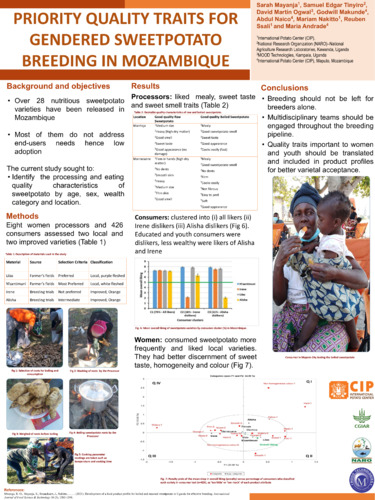Priority quality traits for gendered sweet potato breeding in Mozambique
Abstract
Sweet potato breeders strive to breed varieties that address the productivity challenges farmers face in sub-Saharan Africa (SSA). However, adoption of these varieties is low, partly attributed to limited attention to preferred attributes desired by the end users. This study sought to identify the key traits preferred by eight women processors and 426 consumers (180 male, 246 female) in Manhiça, Marracuene and Maputo districts, Mozambique. Processing diagnostics and consumer studies evaluated four sweet potato varieties: two local (Lilas and N’santimuni) and two improved (Alisha and Irene). Data from processors were analyzed using content analysis and summary statistics, while consumer data were analyzed using the nine-point hedonic test for ‘overall liking’, ‘just about right’, and ‘check all that apply’ tests. Processors prioritized mealiness, sweet taste, not fibrous, good sweet potato smell, ease of peeling, easy to cook, and good appearance for the boiled root. N’santimuni was the most preferred variety for processing. Consumers preferred the N’santimuni and Lilas varieties because of their high dry matter, pleasant sweet potato smell, firmness in the hand, smoothness when eating and sweet taste. The Alisha and Irene varieties were the most penalized with low scores on sweetness, mealiness and firmness. Although varietal preferences between genders differed, the top four attributes were similar except for sweet taste (preferred by women) and softness (favored by men). Also, youth and more educated consumers disliked improved varieties more than adults and lower income consumers. Breeding programs can be enhanced by studies of biophysical and chemical parameters of sweet potato, which will quantify and enable incorporation of quality attributes such as mealiness.

